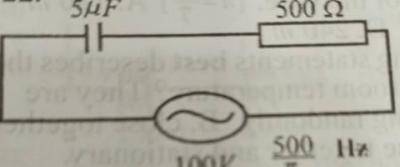
Physics Questions and Answers
If you want to learn more about the nature and properties of matter and energy or you're simply preparing for a Physics exam, these Physics past questions and answers are ideal for you.

If you want to learn more about the nature and properties of matter and energy or you're simply preparing for a Physics exam, these Physics past questions and answers are ideal for you.

The diagram above is an illustration of an a.c. circuit.Calculate the reactance of the capacitor.
2016Ω
2000Ω
200Ω
4000Ω
Correct answer is C
Capacitive reactance, X\(_C\) = \(\frac{1}{2πFC}\) → \(\frac{1}{2π * 500/π * 5 * 10^{-6}}\)
= \(\frac{1}{0.005}\) → 200Ω
Which of the following statements is an effect of compressing gas molecules at constant temperature?
The pressure on the molecules decreases.
The molecules gain more kinetic energy
The molecules make more impact per second on the walls of the container
The molecules increase in size
Correct answer is C
More collisions mean more force, so the pressure will increase.
When the volume decreases, the pressure increases.
This shows that the pressure of a gas is inversely proportional to its volume.
This is shown by Boyle's law.
A ball is swung in a horizontal circle of centre O with a constant speed. acceleration?
Away from O
Along the Circumference of the circle
Toward centre O
Along a tangent to the circle
Correct answer is C
Simple harmonic motion (SHM) is a special type of periodic motion where the restoring force on the moving object is directly proportional to the magnitude of the object's displacement and acts towards the object's equilibrium position.
Which of the following units is equivalent to the unit of electric current?
C s\({-1}\)
W
J s\({-1}\)
C
Correct answer is A
Q = It
I = Q/t
I = C / s
= Cs\(^{-1}\)
An atom that emits an a-particle?
may become a different element.
becomes a different isotope of the element
daughter with increased mass
becomes a daughter of a different element always
Correct answer is A
Alpha decay or α-decay is a type of radioactive decay in which an atomic nucleus emits an alpha particle (helium nucleus) and
thereby transforms or 'decays' into a different atomic nucleus, with a mass number that is reduced by four and an atomic number that is reduced by two.